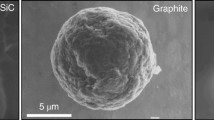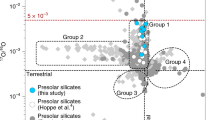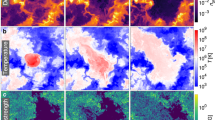Abstract
THERE is now considerable evidence to support the view that supernovae can be caused by the explosive ignition of degenerate material in evolved stars1. The conditions leading to such ignition have recently been investigated by Arnett (ref. 2 and private communication). Explosive carbon-burning produces elements ranging from Ne to Si, and silicon-burning produces elements from P to Ni. The relative abundances of elements produced in both processes are similar to the observed solar values, which supports the view that supernova explosions are a major source of enrichment of the interstellar medium in heavy elements.
This is a preview of subscription content, access via your institution
Access options
Subscribe to this journal
Receive 51 print issues and online access
$199.00 per year
only $3.90 per issue
Buy this article
- Purchase on Springer Link
- Instant access to full article PDF
Prices may be subject to local taxes which are calculated during checkout
Similar content being viewed by others
References
Hoyle, F., and Fowler, W. A., Astrophys. J., 132, 565 (1960).
Arnett, W. D., Astrophys. J., 157, 1369 (1969).
Hoyle, F., and Wickramasinghe, N. C., Nature, 218, 1126 (1968).
Author information
Authors and Affiliations
Rights and permissions
About this article
Cite this article
HOYLE, F., WICKRAMASINGHE, N. Dust in Supernova Explosions. Nature 226, 62–63 (1970). https://doi.org/10.1038/226062a0
Received:
Issue Date:
DOI: https://doi.org/10.1038/226062a0
This article is cited by
-
Cosmic biology in perspective
Astrophysics and Space Science (2019)
-
Dust in Supernovae and Supernova Remnants I: Formation Scenarios
Space Science Reviews (2018)
-
Production of dust by massive stars at high redshift
The Astronomy and Astrophysics Review (2011)
-
Apparent magnitudes of high redshift Type 1a supernovae and intergalactic graphite whiskers
Astrophysics and Space Science (2008)
Comments
By submitting a comment you agree to abide by our Terms and Community Guidelines. If you find something abusive or that does not comply with our terms or guidelines please flag it as inappropriate.



